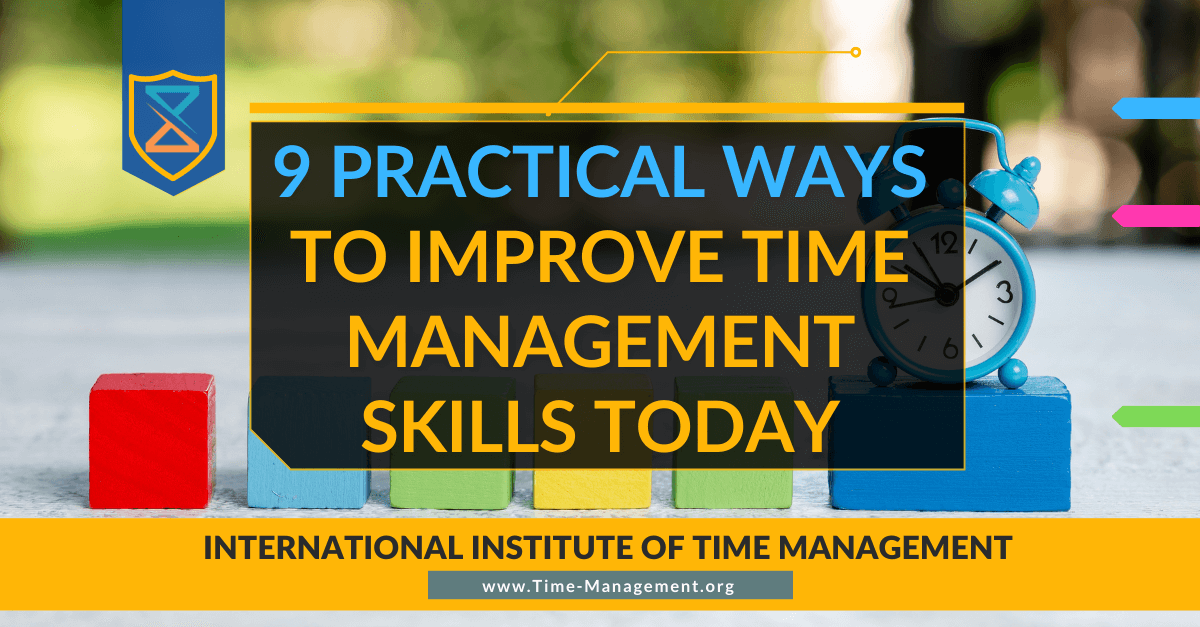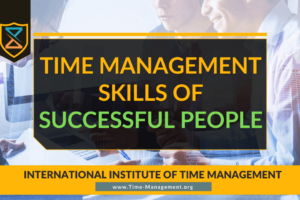

9 Practical Ways to Improve Time Management Skills Today
- Posted by Dr. George G. Tumanishvili
- Categories Articles
How to improve time management and boost productivity?
Sorting out your days might appear to be an overwhelming assignment, especially during a time when there are more interruptions than any other time in recent memory. It found that specialists arrived at the midpoint of only two hours and 48 minutes of useful gadget time a day. Usefulness and burnout avoidance guides say you can capitalize on your useful hours by arranging your workday ahead of time.
Some of the time can begin with a little advance. “Assuming you need to change the world, get going by making your bed, ” resigned U.S. Naval Force Admiral William McRaven said in an initiation discourse at the University of Texas, Austin. When Adm. McRaven was in Navy SEAL training, his educators would review his bed to ensure it was consummately made. In the discourse, Adm. McRaven says it appeared strange to him at first. However, he, in the long run, discovered that achieving this first undertaking of the day gave him a “little feeling of pride” and urged him to go on and complete different errands.
Have a week-after-week audit to decide how to deal with your time.
Fight off the “Sunday scaries” by planning out your week. Marie Poulin, a work process expert, invests some energy on Sunday nights, plotting out how she will spend her weeks’ worth of work. She utilizes time blocks in Google Calendar to initially delineate what she calls “mind, body, and soul” time for self-care. Then, at that point, she sets aside a few minutes for gatherings and different commitments. She likewise utilizes a time-usage methodology called the Pomodoro Technique, which includes separating projects into assignments and zeroing in on them in 25-minute stretches. “I think a useful day consistently begins with a useful week,” Ms. Poulin says.
The arranging meeting doesn’t need to take long, says the author of RadReads, a bulletin, and site that investigates efficiency, cash, and desire. Ten minutes on a Sunday night could save you hours during the week’s worth of work.
How does one intend to get through the following day?
Setting a plan for a gathering: “On the off chance that you set a plan for a gathering, everyone is in the correct spot intellectually, they know precisely the thing you will discuss; the gathering begins immediately and there is no doubt about it.”
To deal with your time better, coordinate your day depending on when you work best.
If you work from home, you may have more flexibility in your working hours. You may be able to start your day earlier but take a midmorning walk—or you may be able to work later and send messages when you are generally ready in the early evening. Seeing how your energetic rhythmic movements can help you plan your day around when you work best, says Ms. Martin.
Start every day with success
Like Adm. McRaven, Mr. Hy recommends starting your day with a simple success, like making your bed. “By making your bed, you’ve gotten a repeatable win before the remainder of the world has even opened their PCs,“ says Mr. Hy. If you are a cheerful early bird, you can also do a job identified with your drawn-out objectives. Consider that you have just dealt with the most significant influence, the most difficult thing you could do in your life for 25 minutes every day for the rest of your life.Anything you at any point looked for from work, you would have in your life, “says Mr. Hy.
Get your day going right to get rid of the pressure
Before you begin reacting to messages, have a go at having a short registration with yourself, says Emily Ballesteros. She puts earphones on and pays attention to a playful melody prior to beginning work for the day to get her mixed up with the right state of mind.
When you have the energy, chip away at the most noteworthy needs-undertakings when you have it. Despite the fact that the normal workday keeps going for eight hours, a great many people are useful for a negligible part of those hours, says Mr. Hy. Since he has the most energy in the first part of the day, Mr. Hy says he knows he needs to finish his key and innovative work before early afternoon. When you choose what your needs are for the afternoon, you should plan the most noteworthy needs for when you have the most energy, he says.
Work in sprints
Figure out a time allotment that you can work on continuously and stick to it. Ms. Ballesteros works in 50-minute additions, and finishes with five-minute “energy blocks.” During these brief breaks, she suggests having a rundown of what you need to do, so you don’t get sucked into your telephone. This may incorporate getting a tidbit, taking a short walk, or doing a little family task. “Cutoff times make earnestness, which makes center,” she says.
Use agendas to more easily deal with your time
For convenience, Ms. Ballesteros suggests keeping two records: a daily agenda and an interruption list. The daily agenda, she says, is there to help you remember your needs during your work runs. The interruption list is all that can crush you. For example, you might remember that you need to message your mother back or need to get something at the supermarket. Ms. Ballesteros recommends making time toward the day’s end to get the fundamentals on your interruption list finished.
Keep away from burnout by making sure to quit working
Without driving, numerous Americans are working longer hours. On the off chance that you put down stopping points for yourself, you will be more useful and less inclined to wear out.
Put forward smart goals
Shrewd objectives are specific, measurable, and achievable within a time frame. Be clear about the result you intend to accomplish and assign the time expected to arrive at your objective.
Figure out how to say no
One vital component of figuring out how to further develop using time effectively is becoming familiar with saying “No” to things that don’t help you achieve your objectives. At the point when you say “no” to something that isn’t actually enhancing your life or supporting your guiding principles or objectives, you are saying “yes” to something different: an ideal opportunity to be with family, practice, or even get genuinely necessary rest. In the event that denying something appears to be hard, consider when you hesitantly said “yes” to something and later thought twice about it. Eventually, you either did the assignment hesitantly even though you didn’t have the opportunity or assets to do it, or you went missing in light of the fact that you were overcommitted. Saying no, in any case, is significantly simpler—and saves you an opportunity to zero in on the main thing.
Distractions should be limited
Consider limiting interruptions as another method of saying “no.” So what’s diverting you? Is it better to use email or web-based media? Whatever it is, say “no.” Eliminate the interruption and the pressure that accompanies it. Set up an “Away” or “Don’t Disturb” notice on your records. Your time is yours, so assume responsibility for your work area and time so you can be useful. Regularly, we allow ourselves to lose center and be hindered as props when we’re encountering awkward feelings like weariness, dissatisfaction, or absence of interest. These are learned, habit-forming reactions – and we can figure out how to conquer them and change our conduct by utilizing powerful time usage abilities as opposed to withdrawing when an undertaking becomes testing.
On the off chance that you experience difficulty saying “no,” it is extraordinary compared to other approaches to further developing your time productively. Quit jotting right away. Mull over everything. Too frequently, individuals request that we accomplish something, and we immediately say yes. Then, at that point, we have a responsibility we’re left with. Rather than noting immediately and giving a reaction, you’ll later lament, move back from the email or advise the individual, and you’ll have to mull over everything. All things being equal, set aside time and guarantee that you submit only those undertakings or exercises that help your basic beliefs and objectives. If something somebody requests that you do doesn’t line up with those qualities and objectives, be striking and cordially decrease. Toward the month’s end, the survey asks how much time did you save. How much more satisfied do you feel with what you achieved?
Consider yourself accountable
All the time-usage abilities on the planet merit nothing on the off chance that you don’t consider yourself responsible. Assume that you need to fortify your relationship with your accomplice, and you choose to use an hour of your day to give that individual the consideration they deserve. Be that as it may, as you’re staying there, your telephone vibrates in your pocket. What do you do?
Rather than checking your phone, concentrate on your desired outcome – a better, more energetic relationship with the person you love – and give your accomplice the attention they deserve. By remaining fixed on your ultimate objective, and letting the telephone discussion hang tight for an hour or more, you’ll accomplish the result that speaks the most to your guiding principle—and gives you more satisfaction than checking your telephone at any point could.
Utilize the 20-Minute Rule
Do you know the inclination when you’re “in the zone”? You’re relentless. Consider the possibility that you could “get in the zone” at whatever point you needed. With the 20-minute augmentation block, you can. Prepare your psyche; let yourself realize you’re going to zero in on something significant. Plan to handle the errand and set a caution for 20 minutes. Until your caution rings, give that task all that you have, with no interruptions. When the caution goes off, decide whether you will put the assignment down or finish it. Enjoy a little reprieve, then, at that point, return to that assignment. Rehash the cycle until the undertaking is finished.
Dealing with your undertakings in these 20-minute lumps assists you in maneuvering yourself into the zone on a case-by-case basis, rather than expecting to fall into it by some coincidence. Over the long haul, you’ll have the option to slip into this attitude all by yourself, without the guidance of a clock.
Reevaluate
Does it need to be the most awesome, productive adaptation conceivable? Reevaluating errands is basic expertise that each fruitful business person and Fortune 500 CEO needs to dominate. Do you think so? When the point comes when you can appoint assignments, do it.
Consider it along these lines: if you’re too focused on finishing a goliath rundown of modest jobs each day, you’ll not be able to zero in on your bigger objectives and guiding principles. It’s likewise advantageous to recall that by assigning sooner rather than later, you assist yourself with developing since you give yourself space to take on the freshest, most testing errands yourself and can designate another person to deal with the more modest, regular things on your plan for the day.
Enjoy a reprieve
On the off chance that this appears to be illogical, – it isn’t. The world’s best individuals know the significance of periodically looking at. Warren Buffett plays the scaffold and practices the ukulele in his extra time. What does Oprah Winfrey think? Simon Cowell climbs trees and watches kid‘s shows! The fact is, at times, everything you can manage is to offer your cerebrum a reprieve from the job that needs to be done.
Regardless of whether you get away to Hawaii or take a noon stroll around your place of business, taking a break allows your cerebrum an opportunity to “reboot.” It really builds innovativeness and focus and prompts better critical thinking. If you’re thinking about how to further develop using time effectively and you feel you’ve taken a stab at everything, step away briefly. You’ll get back to work with restored focus and force.
Viable time usage abilities are at the core of a more joyful, more satisfying life since you’ll have the option to center and accomplish the results that drive your enthusiasm. Envision that exceptional sensation of harmony that accompanies being satisfied with what you’ve accomplished; this inclination is in your grip as long as you focus on recovering your time and pursuing your definitive reason. With the ideal opportunity, the board structure, and magnificent time usage abilities set up, you don’t need to envision that state – you can achieve and live it.
Is Time Management Sabotaging Your Life?
Take control and make an arrangement to deal with your life, not simply your time. Figure out how to achieve more without forfeiting your bliss and enthusiasm. You can learn about life-changing techniques from the busiest managers on the planet. Register for the exclusive course in Time Management offered by the International Institute of Time Management. The course will provide you with techniques backed by science, and you will become a master of time management and productivity
Looking for the Best Time Management and Productivity Growth Courses?
If you would like to learn and master your time management skills with the techniques and learn from the busiest managers in the world, the Time Management Institute offers you a special, backed by science, Time Management online training course, that will enhance your ability to plan and control your time. The online training course is developed by Professor Dr. George Tumanishvili, Founder of the International Institute of Time Management, a world-renowned scientist and coach and is based on his book Time Management That Actually Works. Life-Changing, Effective, Unique Techniques From the Busiest Managers on the Planet.
There is no time to waste!
The International Institute of Time Management offers The Most Effective Time Management Training and Time Management Online Courses in the World. Online courses and training will level up your time management, productivity, planning, and task-handling skills. Passing the online courses successfully will give you the unique knowledge of how to effectively manage your time and achieve your goals. You will also receive an international certificate issued by the International Institute of Time Management. Our certificate is already a mark of the highest quality that has been recognized by the leading companies all around the world.
The Premium Time Management and Productivity Booster Online Courses are for leaders who want to be able to effectively manage their time, plan, and achieve their goals and objectives, also for Individuals and leaders who want to learn how to prioritize and make effective, goal-oriented decisions in the shortest time possible.
Best Free Time Management Courses Online | Best Productivity Courses Online | Best Time Management Courses for CEOs | Best Time Management Courses for Managers | Best Time Management and Productivity Courses for Managers | Best Free Time Management Courses for Leaders | Time Management Skills | The Most Effective Time Management Skills | Time Management for Students | Time Management for Scientists | Time Management Certification | Time Management PDF | Time Management Techniques | Smart Habit Courses | How to Manage Time Effectively? | Most Powerful Techniques of Time Management | Time Management Matrix | Pareto | Eisenhower Matrix | ABC Analysis | Pomodoro
Tag:articles, Automation, Best, Better, Boost, Business, CEO, certificate, Certification, Certified, Checklist, Course, Courses, Decision, Free, georgetumanishvili, Hacks, Improvement, Increase, institute, International, Learn, Management, Manager, Master, Online, Optimization, Planning, Power, Practice, Productivity, Psychology, Routine, Schedule, Skills, Step, Success, Task, Techniques, time, TimeManagementInstitute, Tips, Training, Tricks, Work
Dr. George G. Tumanishvili is one of the founders of the International Institute of Time Management and he is a leading expert and instructor.
Dr. Tumanishvili's experience is connected to providing consultations to more than 100+ companies and over 10000+ people in 25+ countries around the world.
The main scopes of the consultations are time management and productivity growth.
Full details could be found on www.tumanishvili.com/en
You can also, visit his LinkedIn profile and get connected!
You may also like


What is the Mental Basis of Time Management?


Turning Negative Emotions Into Positive Motivation


